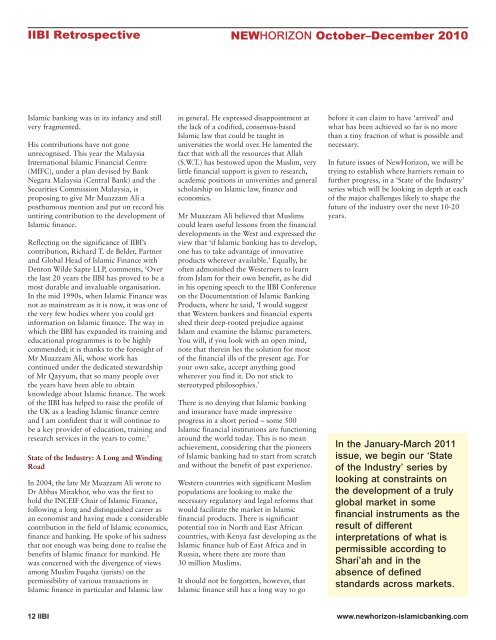NEWHORIZON
NEWHORIZON - Institute of Islamic Banking and Insurance
NEWHORIZON - Institute of Islamic Banking and Insurance
- No tags were found...
You also want an ePaper? Increase the reach of your titles
YUMPU automatically turns print PDFs into web optimized ePapers that Google loves.
IIBI Retrospective<br />
<strong>NEWHORIZON</strong> October–December 2010<br />
Islamic banking was in its infancy and still<br />
very fragmented.<br />
His contributions have not gone<br />
unrecognised. This year the Malaysia<br />
International Islamic Financial Centre<br />
(MIFC), under a plan devised by Bank<br />
Negara Malaysia (Central Bank) and the<br />
Securities Commission Malaysia, is<br />
proposing to give Mr Muazzam Ali a<br />
posthumous mention and put on record his<br />
untiring contribution to the development of<br />
Islamic finance.<br />
Reflecting on the significance of IIBI’s<br />
contribution, Richard T. de Belder, Partner<br />
and Global Head of Islamic Finance with<br />
Denton Wilde Sapte LLP, comments, ‘Over<br />
the last 20 years the IIBI has proved to be a<br />
most durable and invaluable organisation.<br />
In the mid 1990s, when Islamic Finance was<br />
not as mainstream as it is now, it was one of<br />
the very few bodies where you could get<br />
information on Islamic finance. The way in<br />
which the IIBI has expanded its training and<br />
educational programmes is to be highly<br />
commended; it is thanks to the foresight of<br />
Mr Muazzam Ali, whose work has<br />
continued under the dedicated stewardship<br />
of Mr Qayyum, that so many people over<br />
the years have been able to obtain<br />
knowledge about Islamic finance. The work<br />
of the IIBI has helped to raise the profile of<br />
the UK as a leading Islamic finance centre<br />
and I am confident that it will continue to<br />
be a key provider of education, training and<br />
research services in the years to come.’<br />
State of the Industry: A Long and Winding<br />
Road<br />
In 2004, the late Mr Muazzam Ali wrote to<br />
Dr Abbas Mirakhor, who was the first to<br />
hold the INCEIF Chair of Islamic Finance,<br />
following a long and distinguished career as<br />
an economist and having made a considerable<br />
contribution in the field of Islamic economics,<br />
finance and banking. He spoke of his sadness<br />
that not enough was being done to realise the<br />
benefits of Islamic finance for mankind. He<br />
was concerned with the divergence of views<br />
among Muslim Fuqaha (jurists) on the<br />
permissibility of various transactions in<br />
Islamic finance in particular and Islamic law<br />
in general. He expressed disappointment at<br />
the lack of a codified, consensus-based<br />
Islamic law that could be taught in<br />
universities the world over. He lamented the<br />
fact that with all the resources that Allah<br />
(S.W.T.) has bestowed upon the Muslim, very<br />
little financial support is given to research,<br />
academic positions in universities and general<br />
scholarship on Islamic law, finance and<br />
economics.<br />
Mr Muazzam Ali believed that Muslims<br />
could learn useful lessons from the financial<br />
developments in the West and expressed the<br />
view that ‘if Islamic banking has to develop,<br />
one has to take advantage of innovative<br />
products wherever available.’ Equally, he<br />
often admonished the Westerners to learn<br />
from Islam for their own benefit, as he did<br />
in his opening speech to the IIBI Conference<br />
on the Documentation of Islamic Banking<br />
Products, where he said, ‘I would suggest<br />
that Western bankers and financial experts<br />
shed their deep-rooted prejudice against<br />
Islam and examine the Islamic parameters.<br />
You will, if you look with an open mind,<br />
note that therein lies the solution for most<br />
of the financial ills of the present age. For<br />
your own sake, accept anything good<br />
wherever you find it. Do not stick to<br />
stereotyped philosophies.’<br />
There is no denying that Islamic banking<br />
and insurance have made impressive<br />
progress in a short period – some 500<br />
Islamic financial institutions are functioning<br />
around the world today. This is no mean<br />
achievement, considering that the pioneers<br />
of Islamic banking had to start from scratch<br />
and without the benefit of past experience.<br />
Western countries with significant Muslim<br />
populations are looking to make the<br />
necessary regulatory and legal reforms that<br />
would facilitate the market in Islamic<br />
financial products. There is significant<br />
potential too in North and East African<br />
countries, with Kenya fast developing as the<br />
Islamic finance hub of East Africa and in<br />
Russia, where there are more than<br />
30 million Muslims.<br />
It should not be forgotten, however, that<br />
Islamic finance still has a long way to go<br />
before it can claim to have ‘arrived’ and<br />
what has been achieved so far is no more<br />
than a tiny fraction of what is possible and<br />
necessary.<br />
In future issues of NewHorizon, we will be<br />
trying to establish where barriers remain to<br />
further progress, in a ‘State of the Industry’<br />
series which will be looking in depth at each<br />
of the major challenges likely to shape the<br />
future of the industry over the next 10-20<br />
years.<br />
In the January-March 2011<br />
issue, we begin our ‘State<br />
of the Industry’ series by<br />
looking at constraints on<br />
the development of a truly<br />
global market in some<br />
financial instruments as the<br />
result of different<br />
interpretations of what is<br />
permissible according to<br />
Shari’ah and in the<br />
absence of defined<br />
standards across markets.<br />
12 IIBI www.newhorizon-islamicbanking.com
















